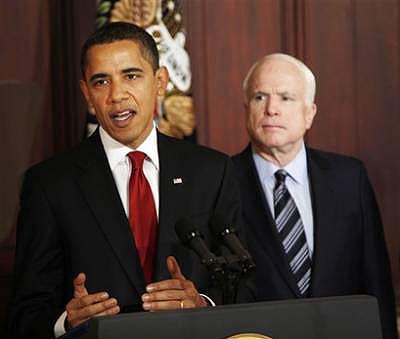| President Barack Obama's proposal to limit itemized tax deductions for high earners is running into opposition from key Democrats in Congress who worry that charities and the housing market would be hurt.
 |
|
Sen. John McCain, R-Ariz. looks on as President Barack Obama makes remarks on government contracts reform, Wednesday, March 4, 2009, in the Eisenhower Executive Office Building on the White House campus in Washington. (Agencies) |
Senate Finance Committee Chairman Max Baucus questioned Wednesday whether the proposal was viable, a day after his House counterpart also expressed reservations.
Treasury Secretary Timothy Geithner said tax increases on families making more than US$250,000 a year are necessary to make a down payment on health care reform and to limit future budget deficits. But, he said, he was willing to work with lawmakers on proposals they objected to.
"We recognize there are other ways to do this," Geithner told the Finance Committee.
Baucus, a Montana Democrat, said he thought the administration would be flexible on the proposal. "They want health care reform as much as I do," he told reporters.
Related readings:
Obama's plan to hike taxes meets fierce opposition
Obama, Brown urge global action on economy
Obama budget bold, achievable
Obama submits first budget to Congress
Geithner and White House budget director Peter Orszag returned to Capitol Hill on Wednesday for a second day of hearings on Obama's US$3.6 trillion tax and spending proposal. Both faced tough questions about the tax package.
Obama's budget calls for setting aside US$634 billion over the next 10 years as a down payment on health care reform. Half the money would come from tax increases on upper-income earners; the other half from cuts to Medicare and Medicaid.
Obama's budget calls for two tax increases on couples making more than US$250,000 and individuals making more than US$200,000. He wants to increase the top tax rates from 35 percent to 39.6 percent by allowing a tax cut enacted under President George W. Bush to expire in 2011.
He also wants to limit the deductions those families can claim for charitable donations, mortgage interest and state and local taxes.
Without the new limits, a taxpayer in the proposed 39.6 percent tax bracket could save US$396 in taxes from a US$1,000 reduction in taxable income. Obama wants to limit deductions to the 28 percent bracket, meaning the same taxpayer would save only US$280.
The higher tax rates are a good bet to become law because Obama campaigned on the change and Congress would not have to do anything to enact them. Once the Bush tax cuts expire at the end of 2010, the higher rates would take effect.
But some key Democrats are wary of limiting deductions.
"I don't want to prejudge anything, but it is certainly one that I am having difficulties with," said Sen. Robert Menendez, D-N.J.
On Tuesday, Rep. Charles Rangel, chairman of the tax-writing House Ways and Means Committee, said he, too, had reservations about the proposal.
"I would never want to adversely affect anything that is charitable or good," the New York Democrat said.
Republicans have been even more critical of the proposal, saying it would reduce charitable donations at a time when many charities are struggling.
"There are people with the means to help. Why would you make it harder for them to do it?" said Rep. Thaddeus McCotter, chairman of the Republican Policy Committee.
Geithner said the change would merely restore the same deduction limits that were in place when President Ronald Reagan left office. | 